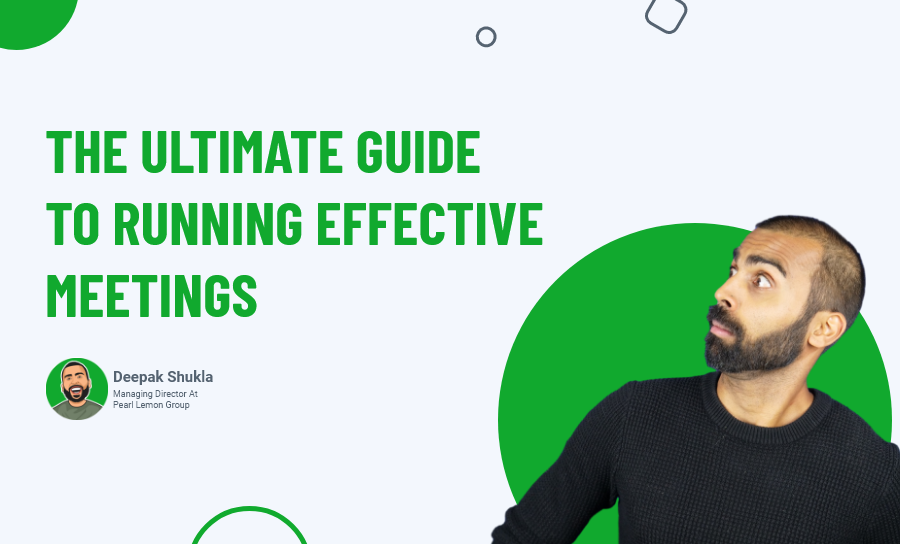Hey guys,
![]()
Here’s today’s time.
On Thursday of last week, I was discussing with my SEO team my keyword strategy for these blogs that I write on a daily basis.
And it got me thinking about the weekly meetings I have in general – and their effectiveness.
So surprise surprise here I am –
With an interest in walking you through my insights and tips on how to run effective meetings, or at least – how we run them at Pearl Lemon.
It’s worth noting within this – that as the team is entirely remote – everyone is at home (I presume) when we have our meetings – and so the meetings are always on Zoom.
So!
With all of this in mind – our meetings run on a weekly basis and there’s a couple that we do –
Table of Contents
The Placement Team’s Weekly Meeting

This is a call typically involving 15-20 of us in the meeting and is held every Friday at 3pm BST.
Now, this is with both our full-time staff as well as maybe from 7-10 people who are on a placement programme with us.
So, the people on this call can often change as well from week to week. Not everyone can always make this meeting, and every month or so there’s someone new on the calls.
Our programmes run from 3-12 months long and we have rolling applications so these meetings also contain some element of the team who are new.
The main purpose of these weekly team meetings is to check-in, have a reason to actually meet the wider team – some of whom several members often know nothing about…and learn something as I’ll explain:
This meeting can last up to 90 minutes and revolves around two specific areas:
A Training Session ‘Meeting’

So this is something that typically I (but now it’s becoming others on the team as well) will teach the rest of the people on the programme.
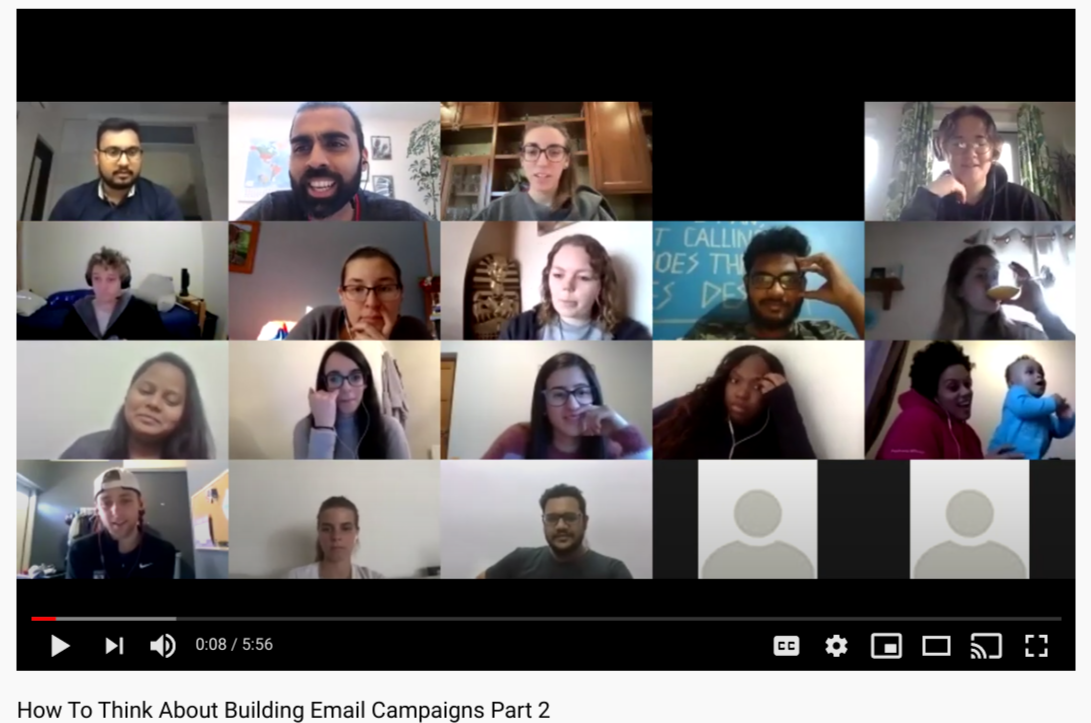
It’ll be practical, hands-on, with most of it being ‘over-the-shoulder’ practical training taking everyone through how to do something or approach something.
The 2nd element of the meeting is:
A Weekly Status Update ‘Meeting’

The reason I’ve labelled them as such is that in many respects – the 2nd half/or last third of the meeting is totally separate from the training side of the meeting.
This is focussed upon having everyone in the team one-by-one walk through what they’ve been up to for the week usually in 2-minutes or less.
I want to walk through some of the effective components of this weekly meeting:
Everyone is required to keep their microphone ON
This is important because it ensures that everyone turns up to the meeting in a place that’s quite enough for them to be able to focus and concentrate on the actual session
Furthermore, it means we can detect if someone is not really listening and is instead got something else playing in the background – this prevents that.
Everyone is required to keep their video ON
A similar principle to above – this is effective because again it ensures focus. I can tell if people are bored/interested/distracted and we can all adjust in real time.
This is a simple but effective method in ensuring higher levels of concentration within the team
Everyone is asked to, in unison – look at their screen
Again – this is to ensure that eye movement can be tracked peripherally whilst talking. There’s nothing worse than someone having their video and mic on, but having other tabs open and switching between something like an IG feed or news site whilst being ‘present’ in the meeting.
This cuts that out as well.
Asking people to keep their face firmly in the middle of the screen, portrait style
Having people that are too far away from their screen, have half their face missing – or anything of this ilk is imho a real pain in the arse.
So keeping the etiquette such that everyone is clear to see and hear is important
Monitoring for ‘screen light’ changes
This is another small thing to watch out for. Sometimes, when people silently switch tabs – there’s a change in the screen brightness which reflects back onto their face.
It’s a quick way to discern whether someone is doing something else on the sly or otherwise.
Doing Random Q&A at the end of the session
In the last 15 minutes of the session, we’ll ask people to mention 1-3 specific things they learnt from that session.
The more specific the better to ensure it’s a real actual thing.
People being asked will be at random – so no one can predict any kind of pattern.
Announcing all of the above at the start of the session
So making these announcements at the start of the session is a great way to remind the team that engagement is key to success with these meetings.
And with ultimately very normal requirements – but ensuring they are all properly followed keeps everyone engaged and on their toes.
Recording the weekly team meetings

Another important factor for ALL of the meetings we run (and I’d recommend this for any/all meetings ((internal/external) as well where possible and with permission) is to record them.
This has changed the nature of information communication within the meetings, and especially for those who are absent from the weekly meetings.
All of the meetings are uploaded for us unlisted onto a YouTube channel we keep specifically as storage for housing meetings.
If it’s an internal weekly meeting we then require anyone who was unable to attend to watch the meeting in their own time and to comment on the YouTube video with their learnings as well as their weekly work update.
In this way, it’s a transparent way to make sure everyone at least is ‘part’ of the meeting – even if it’s through watching it separately after.
The power of recording client meetings

We do this recording as well with all client calls (and ask them for permission at the beginning of each call).
This is fantastic for the wider team if they’re unable to attend the meeting to get to know ‘who the client is’, ‘what they actually want’ and anything else besides.
There are some clients we have weekly meetings and others we do monthly. No matter the situation – all of these meetings are recorded and kept in a playlist which we give access to to the clients as well.
They have even ended up sharing the call with some of their team as well when they’re unable to attend the call.
And it’s an excellent way to keep a historical record.
We’ve sometimes had people internally transitioning between roles and the meetings with clients are a great way for the new person coming in to get to know who the client is – and what the latest thing to work on is needed.
_________
Putting all of these components together ensures you get much much more engagement in these weekly sessions and that everyone is listening and involved.
The keeping of recordings for the historical record is also very powerful for training new team members and using for any other internal purposes.
______
Our weekly ‘departmental’ meetings

This is the other weekly meeting we’ll have with our SEO team as well as our Lead Generation team.
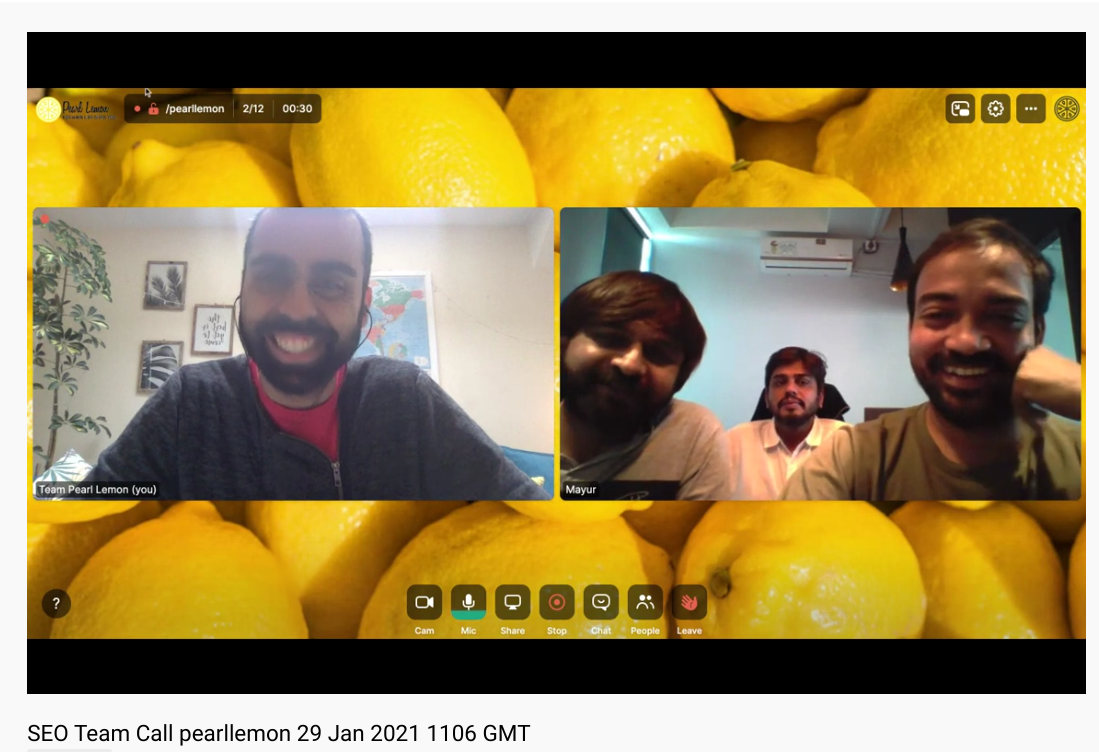
They’re 1x a week catchups to:
- Discuss general client updates
- Work through client issues
- Discuss any ideas we might have for internal work as well as client work
These will be meetings lasting from 30-60 minutes and go through exactly all of the above.
I’m confident the way we run ours is likely similar to the way many agencies run there’s but I’ll go through some of these points in more-depth anyway in case you can pull out some new things from it:
- We’ll work through clients first with a particular focus on what the ‘problems/challenges’ might be
- We then will have room for some general discussion at the end
Team Review Meetings

These are ‘one-on-one’ type meetings where it’ll be focussed around a person’s performance and how they’re doing if they’re doing well and these types of elements.
The challenge sometimes (at least in our instance at Pearl Lemon) is that I won’t necessarily know tons about how said person is operating on a day to day basis as I’m not directly involved in their work.
You’ll probably encounter (if you haven’t already) the same thing at some point.
The way you run a meeting such as this is by making a focus upon this key element:
Ask the person being reviewed how THEY think they’re going – and include some of these specific questions:
What do you think you’ve done well?
What do you think you’ve done badly?
What do you think you need to improve upon?
So these are the three questions that you can ask anyone in a review meeting.
What’s actually interesting is that for the most part – people have an understanding of how they’re performing and this tends to be pretty accurate!
Problem Solving Meetings

These are often unplanned and impromptu – especially if they’re internal meetings. I’m not even sure in some cases whether you would classify them as meetings – but in our case, they are because the whole team is remote.
But with these meetings – they’ll be quick, sharp and short and often to resolve a particular issue that someone is having.
With these meetings there is:
- Minimal small talk
- It’s problem focussed
- Once the problem is solved – you can both get off the call
- They often last <10 minutes
And that’s how we tend to run them
_______________
At a high-level that’s it lol – but I want to (as before) get into the weeds a little with some of the consideration that goes into these meetings and the other things to consider as you try and think about how to keep your meetings bulletproof:
[convertful id=”197358″]
General Guidelines For Effective Meetings:

Do you even need a meeting?
This is something definitely worth asking yourself. I was in a car with two friends yesterday, and they said their world was death by meetings.
Tom, every day, has a meeting with his various heads of departments that’s literally one-hour every day.
He’s an assistant headmaster, and he says these meetings are largely a waste of time and that it really serves teachers who are running experimental projects/getting middling results to justify what they do.
The aim of the meeting is to talk about things that are of general interest and use to the group – but it becomes more so a meeting about self-justification.
A daily meeting of an hour seems excessive.
Conversely – Kye, another friend who was in the car also talked about part of his role being ‘death by meeting’ and laughed about his ‘pre-meeting-meeting’ to discuss what to discuss at their upcoming meeting.
Now – they’re probably reasons for why these meetings get set up that got lost somewhere along the way –
But it’s definitely worth asking yourself WHY you even need a meeting.
I’ve got a new head of lead-generation who comes from a background of having more meetings than I’m used to – and this has been something that’s slowly been drilled into her which is:
Don’t ask if you can ‘have a meeting to go through a few quick questions?’
Don’t send a message asking ‘can I ask you a few quick questions?’
INSTEAD –
Just IMMEDIATELY ask the questions via email/video/voicenote (we’ll talk about this momentarily) and 50-80% of your problems can generally be resolved.
Can your ‘meeting’ be replaced with DM-ing some questions instead?
So an immediate way to actually REDUCE the number of meetings you have (and in this way to make the ACTUAL meetings you have highly effective) – is by:
Emailing the questions you have. This can work when it’s something short and sharp.
If it requires a ‘measured’ or ‘thoughtful response’ – I often tell our team – send a voice note across instead via Whatsapp.
You can communicate tone, message and all very quickly. Furthermore, it allows the sender to send it whenever they want/need to and for the recipient to listen to it at a convenient moment.
It’s all-around faster.
If you need to ‘show’ someone something – like a technical issue you’re facing – what about recording a short explainer video?
We use loom.com (there are many alternatives) to show someone else something.
Always encourage your team to record a video to get help with a technical issue.
Doing all of the above will reduce the need for meetings to almost zero.
_________
Please note that the weekly departmental meeting, as well as the weekly team meetings, are just TWO types of meetings amongst several others.
So I’ll make some brief reference to others as these types may not cover yours:
Daily Meetings

My buddy Tom has daily meetings at his secondary school for an hour each day. And this can be for all kinds of reasons.
Stand Up Meetings

This can be (in frequency) as many times as you like – but I think the general reference with this kind of meeting is that it’s a short meeting where everyone is stood up – and it’s to briefly discuss some things.
There is some level of ‘recurrence’ around these meetings and it’s general in relation to ongoing activities. These are almost like ‘daily updates’ or agenda announcements and ‘quick’ problem-solving.
Tell a lie – we do actually have these fairly often within Pearl Lemon – and I thought about this less because they’re not ‘planned’
Ok – so now we’ve got out of the way all of the ways to AVOID having meetings – there’s also the ‘proper’ consideration of ‘well if I am having a meeting – what are some basic things you’d advise Deepak’.
Well – I’ll go through the practical tips for effective meetings to start with:
Make sure everyone turns up on time
This seems obvious I know – but it really is the bane of meetings when you have the first 10 minutes spent just waiting for people to arrive just so you can kick off the call.
OR you then have to continually repeat yourselves for those who turn up late.
In general, just make it known that turning up to meetings on time is compulsory as this is key to meeting time management.
Do some preparation/planning
Now everyone’s a little different from this. My version of planning depending upon what we’re doing is jotting down some notes 5 minutes before.
So, this advice really depends upon what the agenda for the meeting is.
But having some notes written down before the meeting just to make sure you’ve covered all the points that you want to – and that you’ve advised others to do the same is no bad thing whatsoever
Have An Agenda For The Meeting
What is the meeting there for? What will you be discussing? What is the objective of the meeting? Being clear on this will also make the meeting more productive
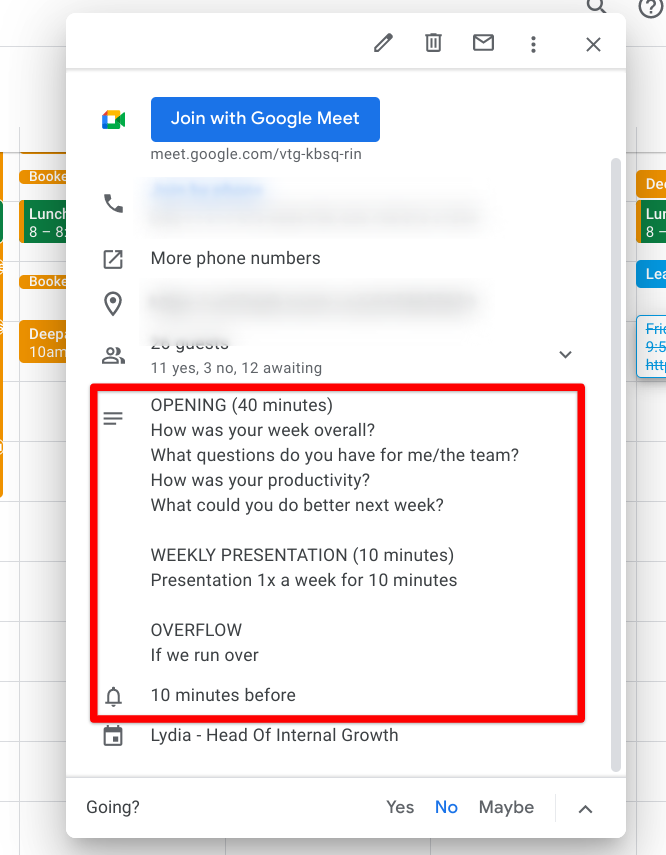
Use The Time You Have Effectively
This means stick to the time allotment you have (if it proves to be inadequate more than twice you either need more time – or need other meetings or something else is going wrong).
Keep people in the meeting on time, make sure everyone knows the agenda, and be strict with the time you have
Allow Some ‘Free Time’ For Anything That Comes Up
Try And Get Everyone To Contribute
If you’ve got 15 people in a meeting that’s obviously challenging – but we’ve found a way to get everyone’s comments in by asking they all give us a status update on how they’re week’s going.
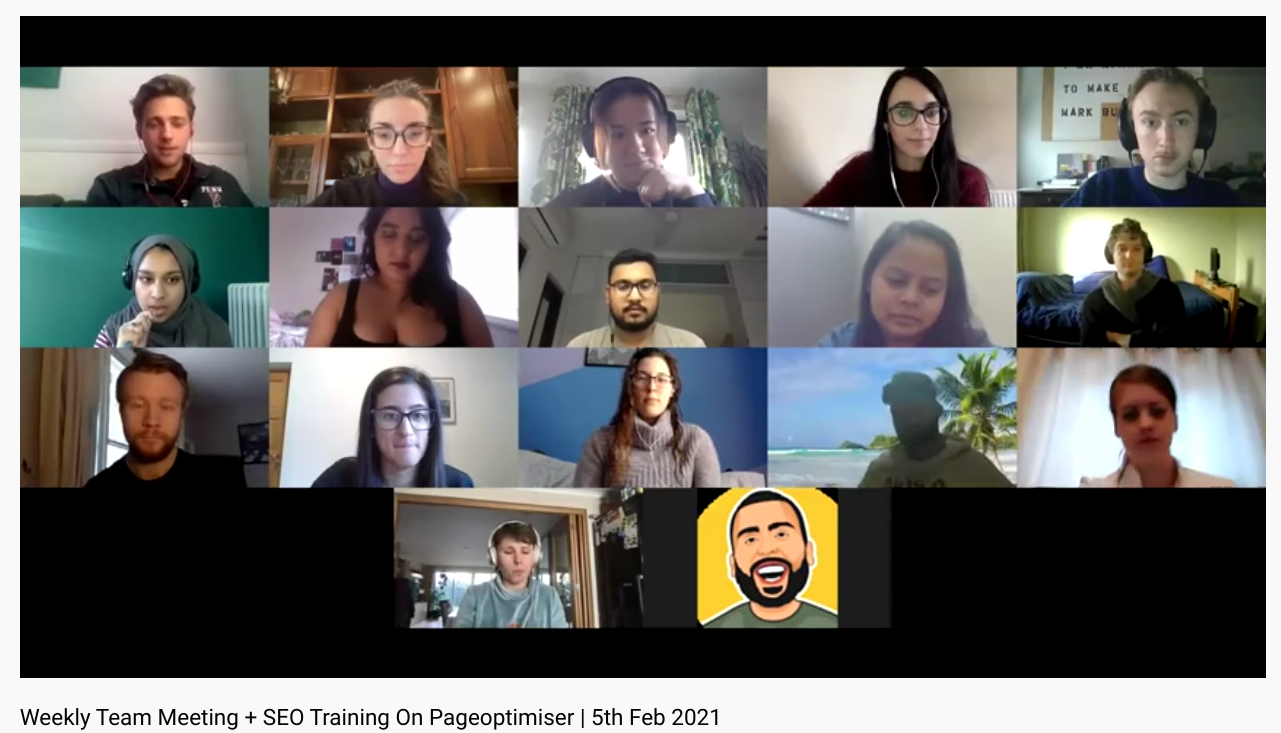
But if people are turning up regularly then they need to be contributing and if they’re not…
Does Everyone In The Meeting Actually Need To Be There?
This is again something else to ask yourself. Is everyone there critical to the meeting? If they’re not – then well – if they like they can catch the replay
(Having all calls recorded is really powerful for this reason)
Make Sure There’s Q&A
A meeting without Q&A – isn’t a meeting. You need to keep sometime during (don’t just wait until the end if it’s a long-ass presentation you’re giving) and at the end for questions.
Make sure of course the questions are on-topic and answer them quickly and effectively
Determine ‘The Pace’ Of The Meeting
Is this going to be a ‘strictly business’ meeting with little small talk – totally focussed on agenda and nothing else?
Or is it a relaxed meeting that allows some room to just catch up.
Understanding what kind of meeting it’s going to be is important in determining the ‘tone’ of the meeting for the best meeting management.
Once you’ve determined this – it’ll also dictate the pace.
Final Thoughts

As I started writing this – I realised how much there is involved with meetings and all of the facts of it. I didn’t think this would wind up being more than 2,500 words.
Although as I googled around, it could probably end up being 10,000 words lol.
Anyway, I hope this gives some solid and practical insights into how we run meetings at Pearl Lemon.
And I hope it gives you some practical guidance on how best to run your own meetings and make them as effective as you possibly can.
Catch you on the next post 🙂

